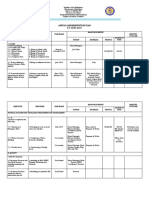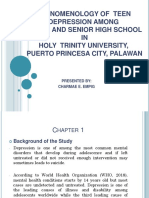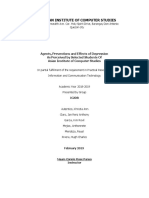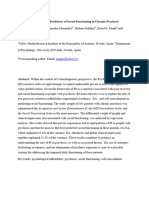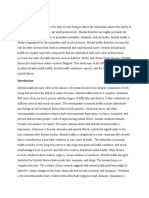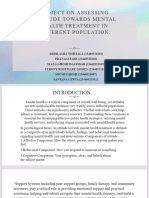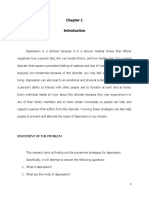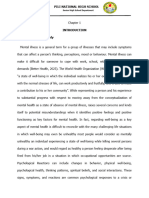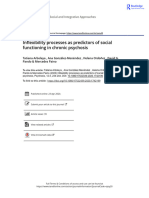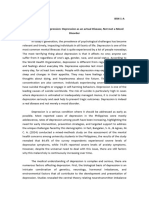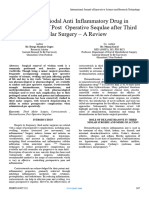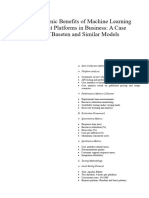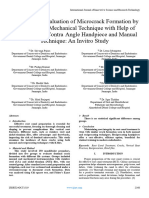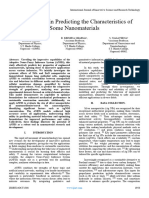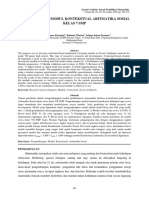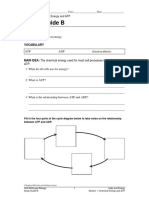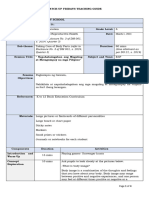Emotional Regulation and Psychological Well-Being in Patients With Diabetes Mellitus
Emotional Regulation and Psychological Well-Being in Patients With Diabetes Mellitus
Copyright:
Available Formats
Emotional Regulation and Psychological Well-Being in Patients With Diabetes Mellitus
Emotional Regulation and Psychological Well-Being in Patients With Diabetes Mellitus
Copyright
Available Formats
Share this document
Did you find this document useful?
Is this content inappropriate?
Copyright:
Available Formats
Emotional Regulation and Psychological Well-Being in Patients With Diabetes Mellitus
Emotional Regulation and Psychological Well-Being in Patients With Diabetes Mellitus
Copyright:
Available Formats
Volume 5, Issue 8, August – 2020 International Journal of Innovative Science and Research Technology
ISSN No:-2456-2165
Emotional Regulation and Psychological
Well-Being in Patients with Diabetes Mellitus
Farra Anisa Rahmania Putri Tri Hutami
Department Psychology Student, Universitas Islam Department Psychology Student, Universitas Islam
Indonesia, Indonesia Indonesia, Indonesia
Fitria Dian Rahmayanti Rannisa Muslaini
Department Psychology Student, Universitas Islam Department Psychology Student, Universitas Islam
Indonesia, Indonesia Indonesia, Indonesia
Abstract:- This study aims to determine the relationship effects with several levels of age such as children, adults,
between emotional regulation and the psychological and the elderly. The psychological effects experienced
well-being of diabetes mellitus patients in Yogyakarta, include symptoms of depression, anxiety disorders, eating
Indonesia. A total of 53 patients with diabetes mellitus disorders such as anorexia nervosa, bulimia, and binge
participated in this study. This research uses the eating disorders, there also severe mental illness like
quantitative method. Psychological Well-being Scale obesity and cardiovascular disease. This consists of
and Emotion Regulation Questionnaire (ERQ) is used to research conducted by Hacket and Stepto (2017) which
measure the variables. Statistical analysis showed that states that physical or biological changes will affect stress
emotion regulation had a positive significant correlation levels, which are exacerbated by unhealthy behaviors such
with psychological well-being. Coefficient correlation as poor diet, little physical activity, and non-compliance in
between emotion regulation and psychological well- taking medication.
being of r = 0.771 with p = 0.000 (p< 0.01). The
relationship between the two variables showed that the As revealed by Ross (2008), individuals who suffer
higher the emotion regulation score, the higher the from severe illness usually go through several stages to
psychological well-being level. successfully accept and make peace with the circumstances
experienced. These stages include denial reaction, in this
Keywords:- Emotional Regulation, Psychological Well- case, individuals tend to reject themselves experiencing
being, Diabetes Mellitus chronic diseases. After that, the stage of anger, where the
individual often wondering about why he had a serious
I. INTRODUCTION illness and was busy looking who is to blame. The third
stage is the stage of bargaining, in this stage, the individual
Referred to as a silent killer disease (Todkar, 2016), usually offers something as compensation to God so that
diabetes mellitus is a disease that sometimes doesn’t individuals can survive and live longer with the disease.
consider as a big problem. As a result, people with diabetes Stage the next is the stage of depression, where at this stage
mellitus didn’t notice that self-management and self- individuals sometimes refuse support from the environment
treatment are important things to do. This causes the effects regarding the disease. The four stages will be directing the
of the disease is getting worse. Diabetics in Indonesia individual towards the last stage, namely acceptance. At the
continue to increase every year. According to data from the stage acceptance, the individual is aware of his illness so
International Diabetes Federation states that in 2015 the that he is slowly able to deal with the situation.
number of diabetes patients in Indonesia reached 10 million
(Kementerian Kesehatan Republik Indonesia, 2016). In The stages that appear in patients with chronic
Yogyakarta, data is obtained from Ngaglik 1 Community diseases cause emotional and psychological problems in
Health Centre located in Sleman district, it shows that the individuals. This is consists of research by Jimenez, Niles,
number of patients with diabetes mellitus in 2017 is 1005, Park (2010) that the level of acceptance associated with the
of which this number increased from the previous year level of emotion and mood regulation. Tiwari (2015) states
which amounted to 833 people. This data will continue that individuals survive against chronic diseases usually
increasing and the estimated number of diabetics in experience emotional disorders as an effect of pain, feeling
Indonesia will reach 21.3 million in 2030. hopeless, and lack of concern for people around them. After
that, he also appears feeling anxious, scared, and depressed
Diabetes Mellitus is a degenerative disease, in which due to the need to regulate daily behavior day. This
patients will decrease conditions over time. This makes the phenomenon is called diabetes distress (Fisher, Hessler,
patient diabetes mellitus tends to experience negative Polonsky, Strycker, Guzman, Bowyer, Blumer, and
emotions before being able to deal with the conditions. In Masharani, 2018). In that research similarly, the results
research conducted by de Groot, Golden, and Wagner obtained in the form of high diabetes distress are often
(2016), there were several psychological issues experienced influenced by poor emotional regulation so that it
by people with diabetes mellitus with several levels of age influences self-control and control metabolism that can
such as children, adults, and the elderly. The psychological affect blood sugar levels.
IJISRT20AUG676 www.ijisrt.com 1652
Volume 5, Issue 8, August – 2020 International Journal of Innovative Science and Research Technology
ISSN No:-2456-2165
According to Thompson (1994), emotion regulation is associated with greater well-being and the part of the
the ability to control behavioral action as a way to express crucial cognitive control process. In addition, emotional
people’s emotions towards the environment. Gross and competence can lead to changes in well-being more
Thompson (2007), stated that emotion regulation is a positive psychological, subjective health, quality of social
strategic ability carried out by individuals to maintain and relations, and job success. In another study conducted by
strengthen positive emotions, as well as reduce negative Karreman and Vingerhoets (2012), emotion regulation acts
emotional responses. Quoted from Gross and John (2003), as a mediator between stickiness and resilience to well-
emotion regulation has two aspects namely cognitive being. The results of the study indicate that high reappraisal
reappraisal and expressive suppression. A cognitive and resilience is one of the important contributors to well-
reappraisal is a cognitive form that has the potential to being.
change emotions in accordance with the thoughts held by
individuals. Expressive suppression is a form of response II. RESEARCH METHODS
adjustment that allows individuals to get blocking the
emergence of negative behaviors from emotional A. Research Subject
expressions that are being made by individuals. Both of The subjects in this study were 53 patients with
these abilities are carried out either consciously or not diabetes mellitus in the Sleman, Yogyakarta with an age
aware and the response that arises can be either emotional range of 40 to 70 years. The subject of this study consisted
or behavioral experience individual against a stimulus. of 10 men and 43 women with various educational
backgrounds from elementary school to the elementary
Individuals with emotional regulatory abilities both school level.
are usually able to maintain or even increase positive
emotions and conversely, it can reduce the negative B. Method of Collecting data
emotions that are felt. Emotional regulation sometimes This research is quantitative research. Data collection
influenced by individual cognitive abilities so this ability in this study uses a scale in the form of a questionnaire to
can be increased at certain stages of development. reveal two variables, namely the variable of emotional
Individuals with good emotional regulation tend to feel regulation and psychological well-being. The emotion
calm and experience a relatively positive life. Therefore, regulation measure used in this study is the Emotion
individuals can also have high psychological well-being. Regulation Questionnaire (ERQ) by Gross and John (2003)
According to Ryff and Singer (1996) psychological well- and the Psychological Well Being scale by Prameswari
being is mental perception throughout the development of (2015).
life in living the challenges of life experience. This is
proven by research conducted by Nelis, Weytens, and Emotion Regulation Questionnaire (Gross, 2003)
Dupuis (2011) which shows that developing emotional consists of 10 favorable questions. This questionnaire using
competence can bring more positive changes to 1-7 scales (1=strongly disagree, 2=disagree, 3=somewhat
psychological well-being, subjective health, quality of disagree, 4=neutral, 5=somewhat agree, 6, agree, strongly
social relations and workability. agree). The higher total score obtained, the higher emotion
regulation that individual has. Otherwise, the lower total
According to Ryff and Singer (1996), psychological score obtained, the lower emotion regulation that an
well-being has 6 aspects of self-acceptance, positive individual has.
relationships with others, autonomy, environmental
mastery, life goals, and self-development. Ryff (2014) also Psychological Well-being Scale (Prameswari, 2015)
states that there are several facilitators that influence consists of 10 item favorable and 9 item unfavorable. This
psychological well-being are the development of age, questionnaire using 1 – 4 scale, 4 = strongly agree, 3 =
personality, family experiences, work, and other living agree, 2 = disagree, 1 = strongly disagree for item
conditions, biological health, and clinical intervention. favorable. For unfavorable item 1 – strongly agree, 2 =
Meanwhile, according to Oskrochi, Mustafa, and Oskrochi agree, 3 = disagree, 4 = disagree. The higher total score
(2018), several factors influence psychological well-being, obtained, the higher psychological well-being that
including the type of sex, marital status, number of jobs, individual has. Otherwise, the lower total score obtained,
and employment status. the lower psychological well-being that individual has.
Through research on improving emotional C. Data Analysis Techniques
competency carried out by Nelis, Kotsou, Quoidbach, Data analysis in this study used the Spearman
Hansenne, Weytens, Dupuis, and Mikolajczak (2011), correlation analysis method. The Spearman correlation is
revealed that subjects can improve emotional function, used after the results of the normality test show that the
change long-term personality, and positive influence in distribution of data is not normal. The technique is to
various aspects of life. Mc.Rae, Jacobs, Ray, John, and determine the relationship between emotional regulation
Gross (2012) state that reappraisal frequency has been and the psychological well-being.
IJISRT20AUG676 www.ijisrt.com 1653
Volume 5, Issue 8, August – 2020 International Journal of Innovative Science and Research Technology
ISSN No:-2456-2165
III. RESEARCH RESULT IV. DISCUSSION
Category Norm Formula Total % Emotional regulation is the ability or strategy that an
Very low x < 51 7 13,21 individual has for maintaining and strengthen positive
Low 51 ≤ x < 54 13 24,53 emotions and reduce negative emotions (Gross, 2003).
Medium 54 ≤ x < 55 13 24,53 Individuals who have good emotional regimes are better
High 55 ≤ x < 57,20 10 18,87 able to keep feeling calm down and have a more positive
Very high X ≥ 57,20 10 18,87 life. The research conducted by Nelis, Weytens, and Dupuis
Total 53 100% (2011) shows that developing emotional competence can
Table 1:- The Psychological Well-Being Scale Samples bring more positive changes to psychological well-being,
subjective health, quality of social relations and
Category Norm Formula Total % workability. Therefore, individuals with good regulations
Very low x < 35,6 10 18,87 will have good psychological well-being.
Low 35,6 ≤ x < 39 5 9,43
The results of the research conducted by Liliana and
Medium 39 ≤ x <41,4 17 32,07
Nicoleta (2014) also prove that emotional stability can
High 41,4 ≤ x < 42 0 0
affect well-being in four dimensions, namely positive
Very high X ≥ 42 21 39,62 affects, negative affects, emotional distress, and life
Total 53 100% satisfaction. Emotional regulation refers to the ability of
Table 2:- The Emotional Regulation Scale Samples someone to understand and accept his emotional
experience, everyone must have a healthy strategy in
According to the research result, there is a level of managing emotions that are not good in order to be able to
categorization of emotional regulation and psychological engage inappropriate behavior. While well-being includes
well-being. The categorization of emotional regulation mental health (mind) and physical health (body) which can
measures is divided into five. In table 2 shows that 18.87% be used as disease prevention and health promotion
of the subjects belong to the very low category, 9.43% of (Verma, Totuka, & Gaur, 2014).
the subjects classified as low, 32.07% of the subjects
classified as moderate, and 39.62% of the subjects Patients with diabetes mellitus will experience many
classified as very high. In table 1 which shows the changes in life. Existence these changes make the patient
categorization of psychological well-being, as many as must be able to adapt in order to accept the situation.
13.21% of the subjects belong to the low category, 24.53% However, the stage of acceptance in patients with chronic
of the subjects belong to the low and medium categories, disease is not easy. That matter according to Ross (2008)
18.87% of the subjects belong to the high and very high statement which states that individuals suffer severe illness
categories. usually through several stages to successfully accept and
make peace with the circumstances experienced. Moreover,
PWB patients with diabetes mellitus are prone to experience
Spearman's Emotional Correlation ,771** negative emotions that will affect the patient's
rho Regulation Coefficient psychological well-being.
Sig. (2-tailed) ,000
N 53 In this study, it was found that cognitive reappraisal
Table 3:- The Test of Correlation between Emotional had a relationship stronger with psychological well-being
Regulation and Psychological Well-Being compared to expressive suppression. A cognitive
reappraisal is a cognitive form that has the potential to
The results of data processing with the Spearman change emotions in accordance with the thoughts of
correlation test on 53 diabetes mellitus patients using SPSS, individuals. Changes in conditions experienced by patients
showed that emotional regulation and psychological well- with diabetes mellitus will make patients more often feel
being were significantly positively correlated (p <0.05) negative emotions for the events experienced. Therefore, a
with a value of p = 0,000. The level of relationship or positive cognitive reaction can change diabetic patients'
correlation between emotional regulation variables and thoughts about negative emotions are felt to be emotions
psychological health is forceful within a value of r = 0.771. more positive in interpreting problems or changes
The relationship between the two variables is emotional experienced. Positive reappraisal also will make patients
and psychological regulation, also has a unidirectional with diabetes mellitus focus more on positive aspects of
relationship. That means that the higher the emotional changes due to pain experience.
regulation of diabetes mellitus patients, the higher the
psychological well-being of these patients.
IJISRT20AUG676 www.ijisrt.com 1654
Volume 5, Issue 8, August – 2020 International Journal of Innovative Science and Research Technology
ISSN No:-2456-2165
V. CONCLUSION AND SUGGESTION [9]. Liliana, B. & Nicoleta, T. M. (2014). Personality,
family correlates and emotion regulation as wellbeing
In this study, emotional regulation is significantly predictors. Procedia-Social and Behavioral
associated with psychological well-being of patient with Sciences, 159, 142-146.
diabetes mellitus. The higher the emotional regulation [10]. Nelis, D., Weytens, F., & Dupuis, P. (2011).
possessed by the subject, the higher the level of Increasing emotional competence improves
psychological well-being. Conversely, the lower the psychological and physical well-being, social
emotional regulation possessed by the subject, the lower the relationships, and employability, 11(2), 354–366.
level of psychological well-being. The following are https://doi.org/10.1037/a0021554
suggestions for future research is the next study should use [11]. McRae, K., Jacobs, S. E., Ray, R. D., John, O. P., &
more participants and be taken from several other regions Gross, J. J. (2012). Individual differences in
in Indonesia. Then, the research on patients with diabetes reappraisal ability: Links to reappraisal frequency,
mellitus is still lacking, especially for patients with Muslim well-being, and cognitive control. Journal of Research
diabetes mellitus. It should be necessary for research in in Personality, 46(1), 2-7.
psychology studies with the subjects is diabetes mellitus https://doi.org/10.1016/j.jrp.2011.10.003
patients. [12]. Oskrochi, G., Mustafa, B. A., & Oskrochi, Y. (2018).
Factors affecting psychological well-being: Evidence
REFERENCES from two nationally representative surveys. PloS One,
13(6), 1-14.
[1]. Fisher, L., Hessler, D., Polonsky, W., Strycker, L., https://doi.org/10.1371/journal.pone.0198638
Guzman, S., Bowyer, V., Blumer, I., Masharani, U. [13]. Prameswari, R., Uyun, Q., & Sulistyarini, I. (2017).
(2018). Emotion regulation contributes to the Terapi dzikir untuk meningkatkan kesejahteraan
development of diabetes distress among adults with psikologis penderita hipertensi. Jurnal Intervensi
type 1 diabetes. Patient Education and Counseling, Psikologi, 9(2), 169-186.
101(1), 124-131. [14]. Ryff, C. D. & Singer, B. (1996). Psychological well-
https://doi.org/10.1016/j.pec.2017.06.036) being: meaning, measurement, and implications for
[2]. Groot, M., Golden, S. H., & Wagner, J. (2016). psychotherapy research. Psychother Psychom, 65(1),
Psychological conditions in adult with diabetes. 14–23. https://doi.org/10.1159/000289026
American Psychological Association, 71(7), 552-562. [15]. Ryff, C. D. (2014). Psychological well-being
https://doi.org/10.1037%2Fa0040408 revisited: Advances in the science and practice of
[3]. Gross, J. J. & John, O. P. (2003). Individual eudaimonia. Psychotherapy and Psychosomatics,
differences in two emotion regulation processes: 83(1), 10-28. https://doi.org/10.1159/000353263
Implication for affect, relationship, and well-being. [16]. Ross, K. E. (2008). On death and dying: What the
Journal of Personality and Social Psychology, 85(2), dying have to teach doctors, nurses, clergy, and their
348-362. https://doi.org/10.1037/0022-3514.85.2.348 own families 40th anniversary edition e-book.
[4]. Gross, J. J. & Thompson, R. A. (2007). Emotion London: Taylor & Francis e-Library.
Regulation: Conceptual Foundations. In J. J. Gross [17]. Thompson, R. A. (1994). Emotion regulation: A
(Ed.), Handbook of Emotion Regulation. New York: theme in search of definition. Monographs of the
Guilford Press. Society for Research in Child Development, 59(2-3),
[5]. Hackett, R. A. & Steptoe, A. (2017). Type 2 diabetes 25-52, 250-283. https://doi.org/10.2307/1166137
mellitus and psychological stress—a modifiable risk [18]. Tiwari, G. K. (2015). Chronic illness affects emotion
factor. Nature Reviews Endocrinology, 13(9), 547- regulation process: A case of HIV/AIDS. The
560. https://doi.org/ 10.1038/nrendo.2017.64 International Journal of Indian Psychology, 3(1), 158-
[6]. Jimenez, S. S., Niles, B. L., & Park, C. L. (2010). A 166.
mindfulness model of affect regulation and depressive [19]. Todkar, S. S. (2016). Diabetes mellitus the ‘silent
symptoms: Positive emotions, mood regulation killer’ of mankind: An overview on the eve of
expectancies, and self-acceptance as regulatory upcoming world health day. Journal of Medical &
mechanisms. Personality and Individual Allied Sciences, 6(1), 39-44.
Differences, 49(6), 645-650. [20]. Verma, B., Totuka, N., & Gaur, J. (2014). Emotional
https://doi.org/10.1016/j.paid.2010.05.041 regulation and well-being in adulthood. International
[7]. Karreman, A. & Vingerhoets, A. (2012). Attachment Journal of Education and Psychological Research
and well-being: the mediating role of emotion (IJEPR), 3(4), 6-8.
regulation and resilience. Personality and Individual
Differences, 53(7), 821-826.
https://doi.org/10.1016/j.paid.2012.06.014
[8]. Kementerian Kesehatan Republik Indonesia. (2016).
Menkes: Mari Kita Cegah Diabetes dengan Cerdik.
Accessed from
http://www.depkes.go.id/article/print/16040700002/m
enkes-mari-kita-cegah-diabetes- dengan-
cerdik.html
IJISRT20AUG676 www.ijisrt.com 1655
You might also like
- Health Psychology Lecture 1Document42 pagesHealth Psychology Lecture 1sherrybrarNo ratings yet
- Stakeholder Post Project Evaluation FormDocument4 pagesStakeholder Post Project Evaluation FormJuan Fernando Suaza RtpoNo ratings yet
- Folie A Deux - The Psychosis of Association PDFDocument34 pagesFolie A Deux - The Psychosis of Association PDFdrguillermomedinaNo ratings yet
- Annual Implementation Plan S.Y. 2020-2021Document10 pagesAnnual Implementation Plan S.Y. 2020-2021Randy MusaNo ratings yet
- Comparing The Efficacy of Acceptance andDocument16 pagesComparing The Efficacy of Acceptance andgoldieavodaNo ratings yet
- Effectiveness_of_Acceptance_and_Commitment_TherapyDocument11 pagesEffectiveness_of_Acceptance_and_Commitment_TherapyThais AzevedoNo ratings yet
- Effect of Acceptance and Commitment TherDocument9 pagesEffect of Acceptance and Commitment TherjaznarNo ratings yet
- Hubungan Mekanisme Koping Dengan Resiko 37de02f8Document7 pagesHubungan Mekanisme Koping Dengan Resiko 37de02f8Widya Nurul agniNo ratings yet
- Analysis of 2 Interviews With Health PsychologistsDocument16 pagesAnalysis of 2 Interviews With Health PsychologistsScribdTranslationsNo ratings yet
- Leyla - Suleymanli - Depression Among TeenagersDocument8 pagesLeyla - Suleymanli - Depression Among TeenagersLeyla SuleymanliNo ratings yet
- RCT Spiritual ReminiscenceDocument8 pagesRCT Spiritual ReminiscencediyanarelNo ratings yet
- The Difficulties in Emotional Regulation Among A Cohort of Females With LipedemaDocument9 pagesThe Difficulties in Emotional Regulation Among A Cohort of Females With Lipedemar.barca98No ratings yet
- Phenomenology of Teen Depression Among Junior and Senior High SchoolDocument15 pagesPhenomenology of Teen Depression Among Junior and Senior High SchoolCha ChaNo ratings yet
- The Relationship Between Severity of Dementia and Subjective Well BeingDocument7 pagesThe Relationship Between Severity of Dementia and Subjective Well BeingANo ratings yet
- Neuroscience and Psychodynamic PsychologyDocument4 pagesNeuroscience and Psychodynamic PsychologyImani ImaniNo ratings yet
- Jurnal Okupasi PDFDocument7 pagesJurnal Okupasi PDFAbdus SalamNo ratings yet
- Group 1 - PaperGESTSDocument30 pagesGroup 1 - PaperGESTSJames Ryan AlzonaNo ratings yet
- Lesson 4 - Mental Health Across The Lifespan: Disaster and Mental Health/ Compiled By: Minera Laiza C. AcostaDocument5 pagesLesson 4 - Mental Health Across The Lifespan: Disaster and Mental Health/ Compiled By: Minera Laiza C. AcostaCala WritesNo ratings yet
- Psychosocial Interventions DraftDocument12 pagesPsychosocial Interventions DraftDwane PaulsonNo ratings yet
- MPR 1820Document13 pagesMPR 1820ankitabhitale2000No ratings yet
- Real ThesisDocument40 pagesReal ThesisEtherious Natsu DragneelNo ratings yet
- Quantitative Methods in Development Research (DEVQUAN)Document23 pagesQuantitative Methods in Development Research (DEVQUAN)Cyan ValderramaNo ratings yet
- Menrall Health BasisDocument6 pagesMenrall Health BasisJay ArNo ratings yet
- Psychotherapy For Treating Anxiety DisordersDocument11 pagesPsychotherapy For Treating Anxiety DisordersShaista ArshadNo ratings yet
- Psychosocial Interventions CompleteDocument14 pagesPsychosocial Interventions CompleteDwane PaulsonNo ratings yet
- Late Adulthood,,-1Document8 pagesLate Adulthood,,-1ian blairNo ratings yet
- Asian Institute of Computer StudiesDocument9 pagesAsian Institute of Computer StudiesBoss OralcNo ratings yet
- Relaksasi Otot Progresif Menurunkan Stres Keluarga Yang Merawat Pasien Gangguan JiwaDocument9 pagesRelaksasi Otot Progresif Menurunkan Stres Keluarga Yang Merawat Pasien Gangguan JiwaSekarwardani21No ratings yet
- The Efficacy of Hope Therapy On The Elderly Depression in Mehriz Day Care CentersDocument6 pagesThe Efficacy of Hope Therapy On The Elderly Depression in Mehriz Day Care CentersDevy Oktavia AnisaNo ratings yet
- Assessment On Mental Health Among Males Age Group 18-23 Years: A Study From Tamilnadu, IndiaDocument3 pagesAssessment On Mental Health Among Males Age Group 18-23 Years: A Study From Tamilnadu, IndiaInternational Journal of Innovative Science and Research TechnologyNo ratings yet
- The Psychology of Health and Illness PDFDocument109 pagesThe Psychology of Health and Illness PDFdevNo ratings yet
- Livingwithschizophrenia KMDocument9 pagesLivingwithschizophrenia KMapi-285356333No ratings yet
- Inlfexibility Predicts Social FunctioningDocument29 pagesInlfexibility Predicts Social FunctioningifclarinNo ratings yet
- Draft 1Document19 pagesDraft 1Shadab KabeerNo ratings yet
- Resume of Paper Kelompok 8Document4 pagesResume of Paper Kelompok 820 -Made Rai Savitri IndraswariNo ratings yet
- Faktor FaktorDocument7 pagesFaktor FaktorEka nandaNo ratings yet
- Attitude PPT With ChangesDocument17 pagesAttitude PPT With Changesfamilyghosh1994No ratings yet
- Group 1 - GESTSResearchPaperDocument35 pagesGroup 1 - GESTSResearchPaperJames Ryan AlzonaNo ratings yet
- 1 s2.0 S0883941722000905 MainDocument11 pages1 s2.0 S0883941722000905 MainReni Tri AstutiNo ratings yet
- PracticalDocument13 pagesPracticalYashika Jain -63No ratings yet
- Psychology Research Paper DepressionDocument4 pagesPsychology Research Paper Depressionafnhiheaebysya100% (1)
- Bataan Peninsula State University College of Engineering and Architecture Architecture FacultyDocument8 pagesBataan Peninsula State University College of Engineering and Architecture Architecture FacultyGeraline Aira TejadaNo ratings yet
- Grade 11 Qualitative Research DEPRESSIONDocument25 pagesGrade 11 Qualitative Research DEPRESSIONRose Marie100% (1)
- Chapter 1Document7 pagesChapter 1magtulismikeyvanNo ratings yet
- Effectiveness of Mindfulness-Based Cognitive Therapy (MBCT) Towards DepressionDocument8 pagesEffectiveness of Mindfulness-Based Cognitive Therapy (MBCT) Towards DepressionyayayNo ratings yet
- Influence of Reminiscence Group Therapy Toward Depression Scores in Elderly in The Age of Service and Administration (BPPLU) in Bengkulu ProvinceDocument6 pagesInfluence of Reminiscence Group Therapy Toward Depression Scores in Elderly in The Age of Service and Administration (BPPLU) in Bengkulu ProvinceAnonymous izrFWiQ100% (1)
- Inflexibility Processes As Predictors of Social Functioning in Chronic PsychosisDocument12 pagesInflexibility Processes As Predictors of Social Functioning in Chronic PsychosisifclarinNo ratings yet
- Effects of Mental Health Program To Minimize The Academic Anxiety of Senior High School Students of Paracale National High SchoolDocument28 pagesEffects of Mental Health Program To Minimize The Academic Anxiety of Senior High School Students of Paracale National High SchoolKaye Ahne Marie PagaoNo ratings yet
- Argumentative EssayDocument3 pagesArgumentative Essayarthgamulao20No ratings yet
- Practical ResearchDocument31 pagesPractical ResearchLj AmorNo ratings yet
- Perbedaan Persepsi Mahasiswa Kesehatan Dan Mahasiswa Non Kesehatan Terhadap Orang Dengan Gangguan JiwaDocument24 pagesPerbedaan Persepsi Mahasiswa Kesehatan Dan Mahasiswa Non Kesehatan Terhadap Orang Dengan Gangguan JiwaDewayuamiNo ratings yet
- Depression Research Paper PDFDocument8 pagesDepression Research Paper PDFgz9g97ha100% (1)
- Pengaruh Terapi Tertawa Terhadap Penurunan Tingkat Depresi Lanjut Usia Lilik Ma'rifatul A., MariyaniDocument9 pagesPengaruh Terapi Tertawa Terhadap Penurunan Tingkat Depresi Lanjut Usia Lilik Ma'rifatul A., MariyaniEfendhi TrioNo ratings yet
- Mental HealthDocument6 pagesMental HealthLiza Mae PisiaoNo ratings yet
- Running Head: Mental Health 1Document8 pagesRunning Head: Mental Health 1Paul WahomeNo ratings yet
- Full Research ProposalDocument10 pagesFull Research ProposalIsaac MbaiNo ratings yet
- Group 4duenes Dulay Falia Gacad Guiao Locloc Mamaril Montemayor PR2 PT2PT3 REVISEDDocument16 pagesGroup 4duenes Dulay Falia Gacad Guiao Locloc Mamaril Montemayor PR2 PT2PT3 REVISEDgrasyapantasya07No ratings yet
- PsychopathologyDocument24 pagesPsychopathologySwarn Raj SahukariNo ratings yet
- Annotated BibliographyDocument8 pagesAnnotated Bibliographyapi-665207114No ratings yet
- Strong 1 Vy Strong Professor Gregory English 1201 29 July 2020Document10 pagesStrong 1 Vy Strong Professor Gregory English 1201 29 July 2020api-519837257No ratings yet
- Nourishing Minds: The Interplay of Eating and Mental HealthFrom EverandNourishing Minds: The Interplay of Eating and Mental HealthNo ratings yet
- Relation between Lumbar Spinal Degeneration and Anatomic Pelvic Parameters in Nepalese PopulationDocument5 pagesRelation between Lumbar Spinal Degeneration and Anatomic Pelvic Parameters in Nepalese PopulationInternational Journal of Innovative Science and Research TechnologyNo ratings yet
- An Observational Study Homoeopathic Medicines in LM Potency for Treating LeucorrhoeaDocument11 pagesAn Observational Study Homoeopathic Medicines in LM Potency for Treating LeucorrhoeaInternational Journal of Innovative Science and Research TechnologyNo ratings yet
- The Level of Awareness and Forecast of Usage of Building Information Modelling by Ghanaian Construction FirmsDocument13 pagesThe Level of Awareness and Forecast of Usage of Building Information Modelling by Ghanaian Construction FirmsInternational Journal of Innovative Science and Research TechnologyNo ratings yet
- Tinospora Cordifolia and Pterocarpus Marsupium: An Anti-Diabetic Plant with MultipurposeDocument11 pagesTinospora Cordifolia and Pterocarpus Marsupium: An Anti-Diabetic Plant with MultipurposeInternational Journal of Innovative Science and Research TechnologyNo ratings yet
- Cybercrime Management: The Role of Cybersecurity Education and TrainingDocument8 pagesCybercrime Management: The Role of Cybersecurity Education and TrainingInternational Journal of Innovative Science and Research TechnologyNo ratings yet
- Politics of Pipeline Ownership, Usage and Obligations in Oil and Gas Sector of South SudanDocument10 pagesPolitics of Pipeline Ownership, Usage and Obligations in Oil and Gas Sector of South SudanInternational Journal of Innovative Science and Research TechnologyNo ratings yet
- Bizz Spot: Revolutionizing Small-Scale Industry through Financial Collaboration and Location IntelligenceDocument19 pagesBizz Spot: Revolutionizing Small-Scale Industry through Financial Collaboration and Location IntelligenceInternational Journal of Innovative Science and Research TechnologyNo ratings yet
- Fetal Health Classification and Birth Weight Estimation Using Machine LearningDocument7 pagesFetal Health Classification and Birth Weight Estimation Using Machine LearningInternational Journal of Innovative Science and Research TechnologyNo ratings yet
- Role of Steriodal Anti-Inflammatory Drug in Management of Post -Operative Sequlae after Third Molar Surgery – A ReviewDocument5 pagesRole of Steriodal Anti-Inflammatory Drug in Management of Post -Operative Sequlae after Third Molar Surgery – A ReviewInternational Journal of Innovative Science and Research TechnologyNo ratings yet
- Security Risks and Threats in Cloud Computing: A Comprehensive AnalysisDocument6 pagesSecurity Risks and Threats in Cloud Computing: A Comprehensive AnalysisInternational Journal of Innovative Science and Research TechnologyNo ratings yet
- Comprehensive Survey on E-Commerce and BlockchainDocument7 pagesComprehensive Survey on E-Commerce and BlockchainInternational Journal of Innovative Science and Research TechnologyNo ratings yet
- Natural Conditions for Tourism Development in the Upper Drainage Area of the Rakitnica RiverDocument16 pagesNatural Conditions for Tourism Development in the Upper Drainage Area of the Rakitnica RiverInternational Journal of Innovative Science and Research TechnologyNo ratings yet
- Socio-Economic Benefits of Machine Learning Deployment Platforms in Business: A Case Study of Baseten and Similar ModelsDocument6 pagesSocio-Economic Benefits of Machine Learning Deployment Platforms in Business: A Case Study of Baseten and Similar ModelsInternational Journal of Innovative Science and Research TechnologyNo ratings yet
- Effectiveness of Teachers Training Program in Enhancing Teaching Competence of Public Primary School Teachers in Ilemela Municipality, TanzaniaDocument11 pagesEffectiveness of Teachers Training Program in Enhancing Teaching Competence of Public Primary School Teachers in Ilemela Municipality, TanzaniaInternational Journal of Innovative Science and Research TechnologyNo ratings yet
- Maternal Mental Health: Addressing Postpartum Depression and Anxiety in Different Socioeconomic ContextsDocument4 pagesMaternal Mental Health: Addressing Postpartum Depression and Anxiety in Different Socioeconomic ContextsInternational Journal of Innovative Science and Research TechnologyNo ratings yet
- Comparative Evaluation of Microcrack Formation by K Files Using Mechanical Technique with Help of Reciprocating Contra-Angle Handpiece and Manual Technique: An Invitro StudyDocument7 pagesComparative Evaluation of Microcrack Formation by K Files Using Mechanical Technique with Help of Reciprocating Contra-Angle Handpiece and Manual Technique: An Invitro StudyInternational Journal of Innovative Science and Research TechnologyNo ratings yet
- Assess Resilience Behavior with Interpersonal Relationship among Faculties - A Correlational StudyDocument5 pagesAssess Resilience Behavior with Interpersonal Relationship among Faculties - A Correlational StudyInternational Journal of Innovative Science and Research TechnologyNo ratings yet
- Innovative TiO2 Photocatalysts: Advances and Strategies for Enhanced Hydrogen Evolution EfficiencyDocument18 pagesInnovative TiO2 Photocatalysts: Advances and Strategies for Enhanced Hydrogen Evolution EfficiencyInternational Journal of Innovative Science and Research TechnologyNo ratings yet
- Impact of Temperature and Shading on Performance of Solar Photovoltaic Systems in Telecom SitesDocument11 pagesImpact of Temperature and Shading on Performance of Solar Photovoltaic Systems in Telecom SitesInternational Journal of Innovative Science and Research TechnologyNo ratings yet
- Discovery of a Stone Circle (Cairn Circle) at Sree Krishna College Guruvayur: A Link to South India’s Stone Age HeritageDocument5 pagesDiscovery of a Stone Circle (Cairn Circle) at Sree Krishna College Guruvayur: A Link to South India’s Stone Age HeritageInternational Journal of Innovative Science and Research TechnologyNo ratings yet
- An Experimental Study on Concrete Strength Optimization with Surkhi as an Eco-Friendly Sand SubstituteDocument13 pagesAn Experimental Study on Concrete Strength Optimization with Surkhi as an Eco-Friendly Sand SubstituteInternational Journal of Innovative Science and Research TechnologyNo ratings yet
- Operational Management Practices of Resorts in Dinadiawan, Dipaculao, Aurora: A Basis for Strategic PlanDocument33 pagesOperational Management Practices of Resorts in Dinadiawan, Dipaculao, Aurora: A Basis for Strategic PlanInternational Journal of Innovative Science and Research TechnologyNo ratings yet
- Classification of the Penguluran River and Mbambang River using Macroinvertebrate with TWINSPAN AnalysisDocument6 pagesClassification of the Penguluran River and Mbambang River using Macroinvertebrate with TWINSPAN AnalysisInternational Journal of Innovative Science and Research TechnologyNo ratings yet
- Neuro Fuzzy in Predicting the Characteristics of Some NanomaterialsDocument6 pagesNeuro Fuzzy in Predicting the Characteristics of Some NanomaterialsInternational Journal of Innovative Science and Research TechnologyNo ratings yet
- Balancing Safety and Justice, the Ethics of Predictive PolicingDocument9 pagesBalancing Safety and Justice, the Ethics of Predictive PolicingInternational Journal of Innovative Science and Research TechnologyNo ratings yet
- Integrating Blockchain and Homomorphic Encryption to Enhance Security and Privacy in Project Management and Combat Counterfeit Goods in Global Supply Chain OperationsDocument22 pagesIntegrating Blockchain and Homomorphic Encryption to Enhance Security and Privacy in Project Management and Combat Counterfeit Goods in Global Supply Chain OperationsInternational Journal of Innovative Science and Research TechnologyNo ratings yet
- A Study of Various Clustering Algorithms Used for Radar Signal SortingDocument12 pagesA Study of Various Clustering Algorithms Used for Radar Signal SortingInternational Journal of Innovative Science and Research Technology100% (1)
- Effect of Sporosarcina Pasteurii on Rheological and Strength Properties of Bio-Self Compacting ConcreteDocument12 pagesEffect of Sporosarcina Pasteurii on Rheological and Strength Properties of Bio-Self Compacting ConcreteInternational Journal of Innovative Science and Research TechnologyNo ratings yet
- Maintaining Integrity and Confidentiality of Patients’ Records Using an Enhanced Security TechniqueDocument7 pagesMaintaining Integrity and Confidentiality of Patients’ Records Using an Enhanced Security TechniqueInternational Journal of Innovative Science and Research TechnologyNo ratings yet
- Optimization of Quadcopter Propeller Aerodynamics Using Blade Element and Vortex TheoryDocument49 pagesOptimization of Quadcopter Propeller Aerodynamics Using Blade Element and Vortex TheoryInternational Journal of Innovative Science and Research TechnologyNo ratings yet
- Reflection LetterDocument2 pagesReflection Letterapi-553020916No ratings yet
- PTE OrientationDocument73 pagesPTE Orientationwhitestone319No ratings yet
- Homework 101 AppDocument4 pagesHomework 101 Appafmtneeic100% (1)
- Teaching TechnologyDocument6 pagesTeaching TechnologyGenesis PalangiNo ratings yet
- 278-Article Text-1438-1-10-20200713Document15 pages278-Article Text-1438-1-10-20200713Muda CreatifNo ratings yet
- Youth Preacher's Training Course APRIL 2020 - Level 1 and 2Document2 pagesYouth Preacher's Training Course APRIL 2020 - Level 1 and 2sanatanNo ratings yet
- Graded Activity 3: Reading Comprehension WorksheetsDocument5 pagesGraded Activity 3: Reading Comprehension WorksheetsDanha BassNo ratings yet
- As Math June 2020 p4 QPDocument32 pagesAs Math June 2020 p4 QPKheya PatelNo ratings yet
- The Predicting Students Performance Using Machine Learning Algorithms.Document3 pagesThe Predicting Students Performance Using Machine Learning Algorithms.Mohammad Rajih BihNo ratings yet
- 1.2 TeacherDocument6 pages1.2 TeacherluiskNo ratings yet
- Quality Form Course Syllabus: FR-INS-04.Rev00Document17 pagesQuality Form Course Syllabus: FR-INS-04.Rev00Jefferson CurammengNo ratings yet
- From Latin To ItalianDocument37 pagesFrom Latin To ItalianVelptonius100% (1)
- hssb0400s StudygdbDocument12 pageshssb0400s StudygdbMohamed HassaneinNo ratings yet
- Practice Questions (Lectures 6 - 10) - 2Document29 pagesPractice Questions (Lectures 6 - 10) - 2Tala MahmoudNo ratings yet
- A Research Proposal OnDocument12 pagesA Research Proposal OnMuiz AdewuyiNo ratings yet
- The Deaf and LanguageDocument18 pagesThe Deaf and LanguageGita Ayu Pradira100% (1)
- EDUC6040 Special Topics in Applied Linguistics Trimester 2A 2024 SEAMEO RETRAC INTDocument13 pagesEDUC6040 Special Topics in Applied Linguistics Trimester 2A 2024 SEAMEO RETRAC INTTrần Bội NgọcNo ratings yet
- Zapf Chancery Publishers Africa Ltd. Researching AIDS, Sexuality and GenderDocument3 pagesZapf Chancery Publishers Africa Ltd. Researching AIDS, Sexuality and GenderPride devilNo ratings yet
- PMBOK 6th Ch010 1Document13 pagesPMBOK 6th Ch010 1Andi EriawanNo ratings yet
- Social Cognition BEAUCHAMP 2020Document10 pagesSocial Cognition BEAUCHAMP 2020Pilar ErthalNo ratings yet
- The Practice Room: Learn To Sight SingDocument50 pagesThe Practice Room: Learn To Sight SingJu DyNo ratings yet
- Gender Etc.Document3 pagesGender Etc.Lucky Esports0% (1)
- Uses MISDocument3 pagesUses MISwattpad adventureNo ratings yet
- Paper Grade 5th MathDocument3 pagesPaper Grade 5th MathkomalNo ratings yet
- Grade6 Esp Health Ed - Catch Up FridayDocument4 pagesGrade6 Esp Health Ed - Catch Up FridayedelbertoNo ratings yet
- AOTMConor PocinoRLDocument1 pageAOTMConor PocinoRLleechardNo ratings yet
- Assessment of Mother's Knowledge Regarding Management of Children With Diabetes Mellitus Type 1Document10 pagesAssessment of Mother's Knowledge Regarding Management of Children With Diabetes Mellitus Type 1Rushikesh JadhavNo ratings yet



